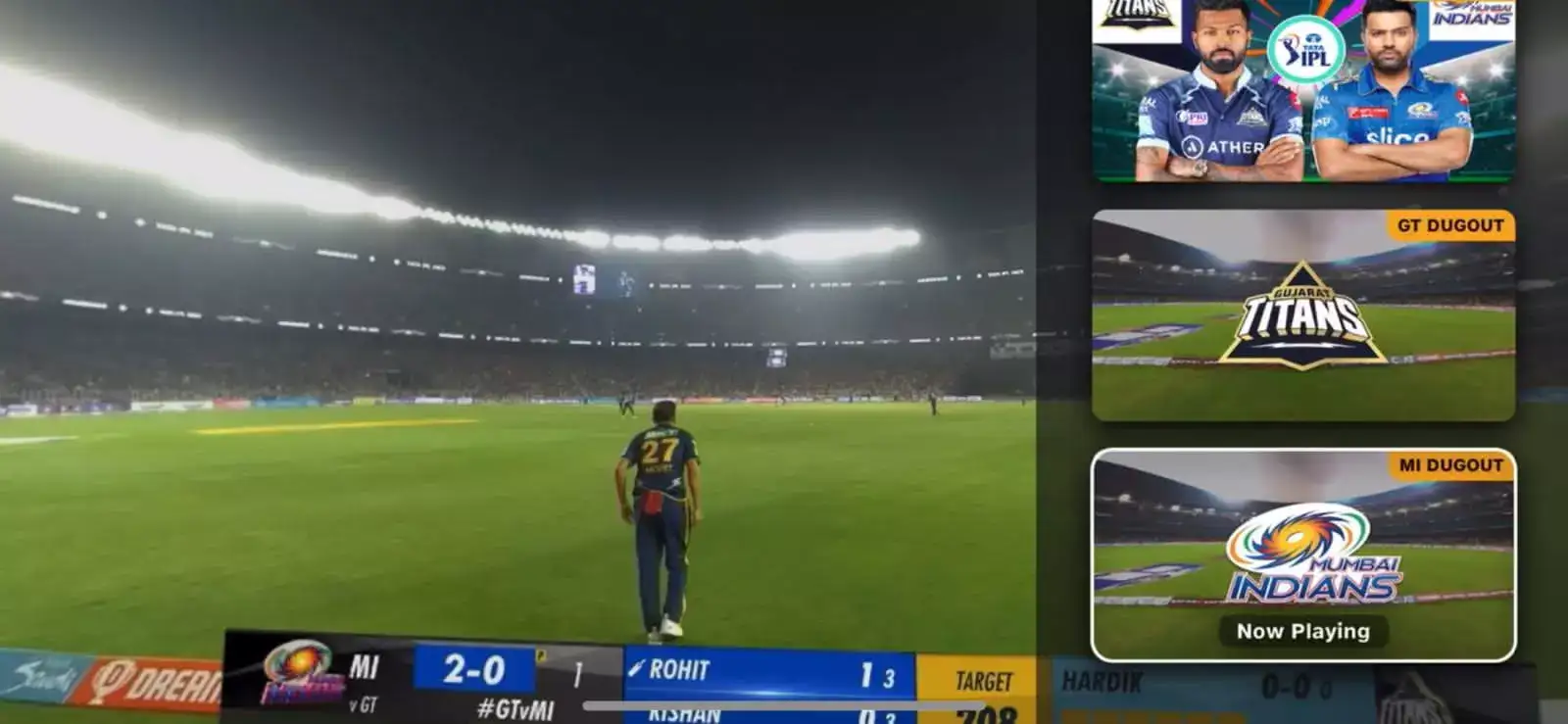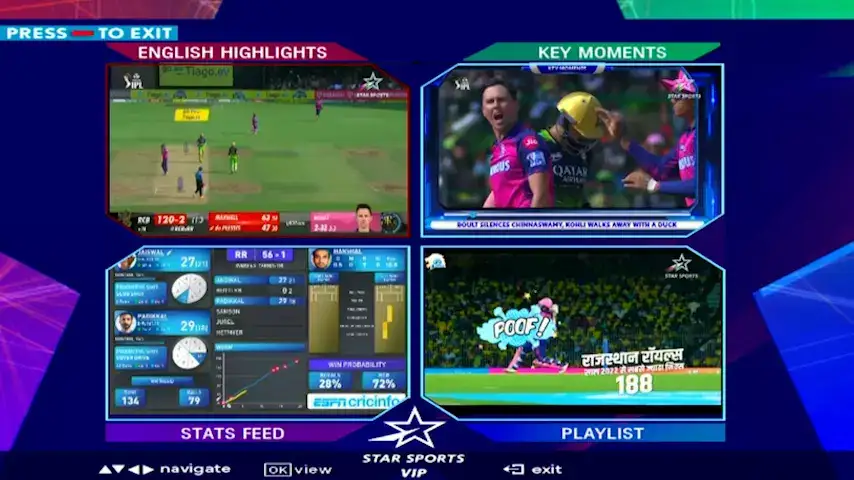The evolution in watching sports on any device has happened thanks to broadcasters enabling technology to be a big player in every game. In fact, the love affair of tech and sports in India has deep rooted connection even in the revolution of TVs going from black and white to colour. India was introduced to colour TVs primarily to showcase the 1982 Asian Games.
As for cricket, the most followed sport in India, it has evolved from red ball and green tops to today’s magnanimous craze for the $11 billion worth Indian Premier League. Alongside what has grown is a cartoon of a sobbing duck when a batter scored a zero to today’s features ranging from a hologram technology placing commentators in studios to engrossing fans during live matches.
While the list of ever-evolving tech innovation is already too long, Sanjog Gupta, Head of Sports – Disney Star, said we have just started scratching the surface with regard to the innovations.
Of the fans, by the fans, for the fans
“Watching cricket now is like witnessing the evolution of species. The game has transformed from a leisurely-paced pastime to a high-octane spectacle, with new formats, rules, and technologies bringing a whole new dimension to the sport,” said Hitesh Rajpurohit, a cricket addict and Co-Founder and CEO of Cutting Fillum Entertainment.
Rajpurohit said he vividly recalls how much fun it was to watch cricket on TV with his family and friends as a kid. “To fix the antenna and get the signal of the station that broadcasts the game in my hamlet was a major accomplishment,” he said. Today, times have changed and so has viewing cricket. The luxury of watching cricket on a phone, whenever and wherever, or community viewing via large TV screens at public places, is equally thrilling.
Technology now has enabled viewing the game in a manner which is like having your own personal cricket channel, he said.
The demand of or by the fans for constant evolution is perhaps what has driven broadcasters to adopt advanced technology for the fans, among other factors.
Sanjog Gupta said as far as coverage of sports is concerned for Disney Star, there are three driving factors for innovations – a focus on deepening the engagement of fans, understanding fan behaviour to customise offerings, and the constant push for improved efficiency of internal processes, workflows and the production back-end.
The wagon wheel of tech for watching IPL 2023
Watching the highlights of the first match of the cash-rich tournament and a game today of what has grown to be the world’s second richest league will clearly reflect the tech play that has been brought in.
JioCinema, the official streaming partner of IPL, lets fans select camera angles, commentary language, live stats in the app, fan interactions and quizzes among other features. Termed as hype mode, it also allows fans during live matches to rewind an action, see all necessary stats of the match or the tournament points table, play the best angles for key highlights and even set the speed for playback. Mukesh Ambani’s flagship OTT platform JioCinema is streaming IPL in 4k resolution and also enables Dolby Atmos audio feature.

A screen grab from JioCinema showing the live stats feed
Along with the multi-cam setup with Hype feature, JioCinema is offering 16 unique feeds, including an Insiders feed, Hangout feed, Fan feed, and Fantasy feed. One can even switch to watching the game with a 360 degree vision to showcase what the game looks like from the participating teams’ dugouts.

A screen grab from JioCinema’s live IPL streaming showcasing the feature to chose 360 degree view
Meanwhile, Disney Star, the official broadcaster of IPL, too has roped in Dolby to offer Atmos sound feature while they also offer an ambience only mode. The network along with Dolby has placed more than 40 microphones in each stadium to capture the best sound and offer an immersive experience.
While TVs are no more the so-called stupid boxes, the legacy company has added interactive features in TV itself where fans can watch real-time match highlights, select from a host of regional language commentaries, fix camera on their favourite stars, access stats feed and even let fans switch on subtitles, which is key during community viewing in a public place either amid hullabaloo or roar of the fans.

Disney Star has launched Pro and VIP features for Tata and Airtel’s set-top boxes that offers mutiple features from match highlights to stats
Disney Star also has a meta fan interaction feature. In this, powered by 5G, fans could interact with their favorite cricketer from any remote location over the internet with their Meta-Avatar projected in Disney Star’s studios. It is also using the Metaverse, which the company described as the next-gen interactive platform for all sports lovers to watch live events – matches, live concerts – with friends and family.

Disney Star’s Meta fan interaction feature
IPL has also invested in augmented reality for fans to get interactive experiences in the form of virtual games. Tech has come far. A VR immersive cricket game feature of Disney Star also delivers mixed reality output, broadcast-like output, and stabilized POV output for advanced analysis of the game.
BTS and the merging illusion with reality
The tech for sports broadcasting has reached a high where commentators or experts are teleported to studios from overseas lands. The studio with its green screen and the vfx then creates a background typically of a glass window overlooking a city or the ground where the game is played.
The hologram technology is near perfect and Twitter was set ablaze when IPL started this year as netizens spoke how they could not figure out Steve Smith was not in the studio of Disney Star during a match.

Disney Star’s hologram technology that teleported Steve Smit to the studio in Mumbai while he was in Australia
Don’t be surprised if you find out that not even all commentators commenting in the popular English or Hindi language are seated in the studios and teleported to look like they are seated at the venue.
To make the illusion look real, Disney Star has multiple images from across stadiums. The broadcaster also uses spider-cam, the ones used in the ground, for various shows and a tour to the studio too can give you the vibe of the press box at a stadium.
While many of these innovations are born to cater to demands of fans, they are also proponents of optimal resource utilisation.
Disney Star, for example, said the laurels are to be given to broadband connectivity that they have enabled in various stadiums around the country to produce customised coverage of specific feeds for specific regions in the languages of choice, as well as talent of choice.
“So, if we have to produce fully customised feeds for Tamil Nadu or Karnataka, we cannot keep building commentary boxes at the venue because the real estate at the venue is limited and thus the remote production model, which is something that we have been pioneers in starting in 2015, has played a significant role in enabling the creation of this,” Gupta said.
The remote production model has now become the norm for any marquee cricket event to have multiple feeds catering to different regions across the country.
New kids to legends, adding tech catalyst
To decide on what tech needs to be implemented, Gupta said Disney Star looks at three filters – the insight and the consumer strategy, the scale of deployment and impact possible, and ROI.
However, there are the new kids of the industries, or startups, engaged along with the established players to add the vital tech element in broadcasting the games. The broadcasters too may have their own research and development teams.
Disney Star partners with global tech services providers who already have a ready-made product that can be deployed on broadcast, which is the case with Hawk-Eye. Their second model involves an in-house development model and this is where they have spent significant efforts to even build what they call a Star Lab. They also work with startups like Ink In Caps, who is onboarded as part of the Star Lab collaboration to develop specific solutions. The broadcaster also partners with global tech providers who may have solutions which can be customised and also built further to develop proprietary tools for deployment.
Disney Star has a partnership with Epic Games, which is one of the world’s largest gaming software and engine providers, to develop real-time 3D graphics.
The return on investment is however crucial for the sports broadcasters.
“At the end of the day, there is a certain budget that we work with. We have to make sure that the choices we make are genuinely delivering to the objectives we have, but they can also deliver within the budget we have, and have an ROI in terms of the impact that these solutions will have, which validates the choice to make that investment,” Gupta said.
Gupta said the journey of tech innovation is one that does not have a destination. It is uncertain if there is a finish line to innovations in bringing the sports live for fans on their TVs, digital devices or any medium that may be invented in future.
Nonetheless, the game must be enjoyed to the fullest and every moment must be cherished, for you may not watch MS Dhoni live in action again after this IPL, unless an AI comes cloned or disguised in his avatar on the ground. But, won’t that be too plastic?










